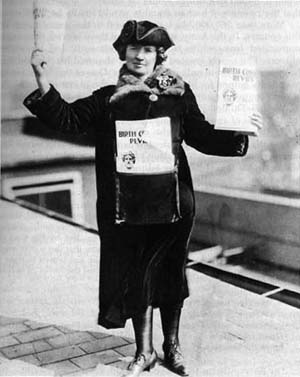Remembering Margaret Sanger
By Gloria Feldt
“Woman must have her freedom, the fundamental freedom of choosing whether or not she will be a mother and how many children she will have. Regardless of what man’s attitude may be, that problem is hers – and before it can be his, it is hers alone.”
Sept. 14 is the birthday of Margaret Sanger, founder of the U.S. birth control movement. She was born Margaret Higgins in Corning, New York, in 1879, though ever vain, she would later alter the family Bible to appear three years younger. The sixth child of eleven living siblings, her earliest childhood memories were of crying beside her mother’s bed as after she almost died following a difficult childbirth.
Sanger’s mother, Anne Higgins, did die, worn out from those too frequent pregnancies and births, at age 50. These experiences formed the sensibilities that propelled Margaret Sanger to advocate for birth control. She dedicated her first book on the fundamental rights of women to control their fertility to her mother. The quotation above and those that follow reveal her clear worldview about women and a laser-like focus on the work she believed to be the most essential to women’s health, well-being, and rightful place in the world:
“She goes through the vale of death alone, each time a babe is born. As it is the right neither of man nor the state to coerce her into this ordeal, so it is her right to decide whether she will endure it.”
Perhaps the best-known and most quoted of Sanger’s statements is this one that cuts to the core of why reproductive self determination is simple justice for woman, and that without the freedom to make her own childbearing decisions, no other freedoms have meaning:
“No woman can call herself free who does not own and control her body. No woman can call herself free until she can choose consciously whether she will or will not be a mother.”
But her belief in the value of birth control went beyond feminism and women’s freedom. Too often, the right to sexual pleasure is pushed aside in the debates over birth control access today. Margaret took this subject on in the same frank way she took on other issues, and even included guidance about achieving orgasm in some of her writings. She spent much of her life raising money and supporting the research that led to the birth control pill, believing that a reliable method that could separate intercourse from the mechanics of birth control could not only dramatically reduce unintended pregnancies but also increase a couple’s sexual pleasure.
When she started her quest at the dawn of the 20th century, birth control was illegal and such methods as existed were rudimentary at best. Indeed, the term “birth control” hadn’t even been created. “Family limitation” was the term of art at the time, and “reproductive health” wasn’t even a glimmer in anyone’s eye. Sanger had neither funds nor powerful supporters nor the force of public opinion behind her when she took her first bold steps. But she had passion for her mission, a vision of how she would bring birth control to women through a network of clinics that ultimately became Planned Parenthood. She had a sharp sense of how to use controversy and the media to stir up support for her cause:
“Woman must not accept; she must challenge. She must not be awed by that which has been built up around her; she must reverence that woman in her which struggles for expression.”
Sanger’s words which have most influenced my approach to life and my work for women’s reproductive rights, health, and justice are simply these:
“Life has taught me: we must put our convictions into action.”
I suspect that were she still alive, it would please her greatly to know that so many people continue to put our convictions into action for the cause she began. But she would be appalled to see the many challenges that still exist to keep women from having universal and affordable access to birth control. Ellen Chesler’s biography of Sanger ends with her granddaughter and namesake, Margaret Sanger Marston, asking her grandmother how she wanted to be remembered. Margaret Sanger’s response was that “she hoped she would be remembered for helping women, because women are the strength of the future. They take care of culture and tradition and preserve what is good.”
And that’s how we should remember her today. Thanks to Sanger, so many women can now joyously celebrate their freely chosen “birth days.”

